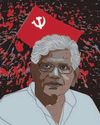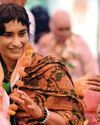Saudi Arabian women may now be enjoying new rights, but speaking out against injustices or being critical of the establishment is still not acceptable

For 30-year-old Ibtehal Al Shareef, mobility equals freedom. The schoolteach-er-turned-photographer from Jeddah remembers the time when she had to depend on cabs or on her father or brother to ferry her to the workplace and back. She had got her driver’s licence while the family lived in Dubai, but could not get behind the wheel in her home country because of a ban on women driving.
And, then came the moment of liberation. “I felt unshackled, liberated,” said Al Shareef, recalling the time when she steered the family car out of the garage and onto the wide roads of Jeddah. “There were so many other women drivers on the roads. It was freedom at midnight.”
It was at the stroke of midnight on June 24, 2018, that the ban on women driving in Saudi Arabia came to an end. There was celebration and jubilation as scores of women burned rubber across major cities. The occasion even saw Princess Hayfa bint Abdullah Al Saud, daughter of the late king Abdullah, appear on the cover of Vogue magazine, in the driver’s seat of a red convertible, glamourously attired in a fashionable abaya, complete with black leather gloves and high heels.
The driving ban was repealed through a royal decree in September 2017, and the first driver’s licences were issued to women in the first week of June 2018, most of them in exchange for driving permits procured in other countries. The lifting of the driving ban is perhaps the biggest sign of the dramatic change that is currently under way in the kingdom in terms of empowerment of women. “It will bring more women into the work force. It will contribute to their feeling of independence and empower them,” said Al Shareef.
Denne historien er fra February 17, 2019-utgaven av THE WEEK.
Start din 7-dagers gratis prøveperiode på Magzter GOLD for å få tilgang til tusenvis av utvalgte premiumhistorier og 9000+ magasiner og aviser.
Allerede abonnent ? Logg på
Denne historien er fra February 17, 2019-utgaven av THE WEEK.
Start din 7-dagers gratis prøveperiode på Magzter GOLD for å få tilgang til tusenvis av utvalgte premiumhistorier og 9000+ magasiner og aviser.
Allerede abonnent? Logg på

Themes Of Choice
As Savvy Investors Seek New Avenues, Thematic Mutual Funds Are Gaining Popularity

A golden girl
One of India's most formidable beauties passed away earlier this month. The odd thing is she would absolutely hate this obituary; she hated being written about and avoided publicity for all of her nine decades. Indira Aswani was 93 when she died. But anyone who encountered her, even briefly, was in such awe of her grace and poise, and one could not but remember her forever.

The interest in wine is growing delightfully in India
The renowned British wine writer and television presenter Jancis Robinson, 74, recently came to Delhi and Mumbai to reacquaint herself with India's wine industry. This was the Robinson's fourth visit to India; the last one was seven years ago. On this trip, Robinson and her husband, restaurateur Nicholas Lander, were hosted by the Taj Hotels and Sonal Holland, India's only Master of Wine.

United in the states
Indian-Americans coming together under the Democratic umbrella could get Harris over the line in key battlegrounds

COVER DRIVE
Usage-driven motor insurance policies offer several benefits

GDP as the only measure of progress is illogical
Dasho Karma Ura, one of the world's leading happiness experts, has guided Bhutan's unique gross national happiness (GNH) project. He uses empirical data to show that money cannot buy happiness in all circumstances, rather it is family and health that have the strongest positive effect on happiness. Excerpts from an interview:

India is not a controlling big brother
Prime Minister Tshering Tobgay considers India a benevolent elder sibling as the \"big brotherly attitude\" is happily missing from bilateral ties. He thinks the relationship shared by the two countries has become a model of friendship not just for the region, but for the entire world. \"India's attitude is definitely not of a big brother who is controlling and does not allow the little brother to blossom and grow,\" says Tobgay in an exclusive interview with THE WEEK.

Comrade with no foes
Lal Salaam, Comrade Yechury-you were quite a guy!

Pinning down saffron
In her first political bout, Vinesh Phogat rides on the anti-BJP sentiment across Haryana

MAKE IN MANIPUR
Home-made rockets and weapons from across the border are escalating the conflict